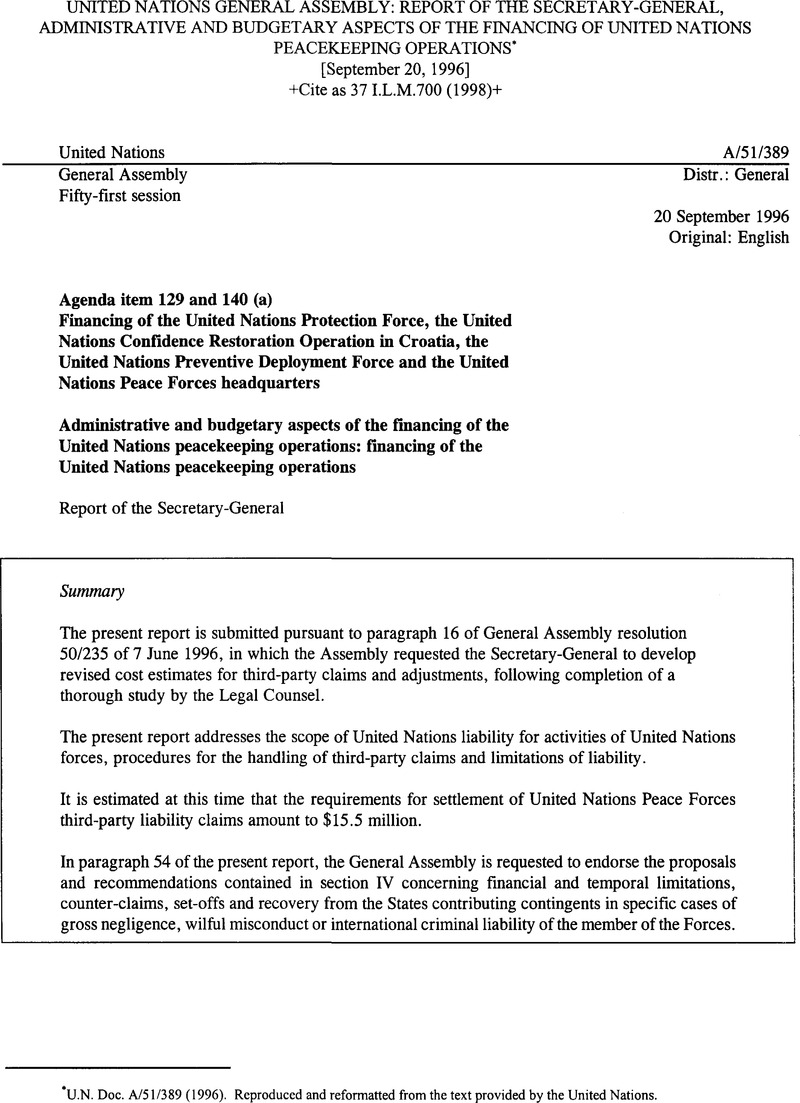No CrossRef data available.
Published online by Cambridge University Press: 18 May 2017

U.N. Doc. A/51/389 (1996). Reproduced and reformatted from the text provided by the United Nations.
1 For the purpose of the present report, third-party claims do not include claims that arise within the context of a contractual or other direct legal relationship between the claimant and the United Nations. Claims arising from contracts or leases are, therefore, excluded from this study. Claims arising from accidents involving of official United Nations vehicles are also excluded. In most cases they are covered under the terms of the United Nations worldwide insurance policy against third-party liability and are, therefore, settled by the insurance company's designated representative or agent in accordance with the local law of the State concerned. If, however, the insurance company has not designated a representative to handle such cases in that locale, such claims are reviewed by the local claims review board of a mission in the first instance and thereafter forwarded to the insurance company for processing.
2 In a letter dated 6 August 1965 from the Secretary-General to the representative of the Union of Soviet Socialist Republics concerning the payment of indemnities to Belgian citizens resident in the Democratic Republic of the Congo (S/6597), it was stated:“It has always been the policy of the United Nations, acting through the Secretary-General, to compensate individuals who have suffered damages for which the Organization was legally liable. This policy is in keeping with generally recognized legal principles and with the Convention on the Privileges and Immunities of the UnitedNations.”
3 In the absence of a definition of what constitutes State-owned property, or a test of ownership in case of doubt or mixed ownership, the notion of State property should be interpreted strictly. By analogy with article 56 of the Hague Regulations, the property of municipalities should be considered for the purposes of peacekeeping operations as private property.
4 See the Secretary-General's summary study on the experience derived from the establishment and operation of the United Nations (A/3943, para. 142).
5 The concept of “operational necessity” as used herein has been developed in the practice of United Nations operations. It is distinguishable from the concept of “military necessity”, which is limited to combat operations and is governed by the laws of war. Both concepts are, however, conceptually similar in that they serve as an 712 International Legal Materials [VOL. 37: exemption from liability, or a legitimization of an act that would otherwise be considered unlawful.
6 See ST/AI/149/Rev.4, paras. 16-18. Normally, a typical claims review board consists of a minimum of three staffmembers performing significant administrative functions. Wherever possible, a Legal Adviser, or a staff member with legal training should also be a member. The following is an example of the typical composition of a local claims review board:
Chairperson:Chief Administrative Officer
Member:Legal Adviser
Member:Chief, Finance Officer
Member:Chief, General Services
Secretary (ex-qfficio):Chief, Claims Unit
7 The question of who owns the property has arisen in a number of claims for property damage submitted by local authorities in the former Yugoslavia. These claims have raised difficult questions as to whether the owner of theproperty, and thus the party entitled to compensation, was the local authority or a private party.
8 The procedure for settling the Belgian claims was described in the Secretary-General's letter of 6 August 1965 to the representative of the Union of Soviet Socialist Republics. Accordingly, the claims submitted were investigated by the competent services of ONUC and United Nations Headquarters. Claims for damage due to military operations or military necessity were excluded, as well as claims for damage caused by non-United Nations personnel. Of approximately 1,400 claims submitted by Belgian nationals, the United Nations accepted 581 asentitled to compensation. Following consultations with the Government of Belgium, a lump-sum payment in the amount of $1.5 million was agreed as a final settlement of the matter. At the same time, a number of financial questions that were outstanding between the United Nations and Belgium were settled. Payment was effected by offsetting the amount of $1.5 million against unpaid ONUC assessments amounting to approximately $3.2 million(see note 2 above, document S/6597).
9 The Headquarters regulation No. 4 on ȜLimitation of damages in respect of acts occurring within the Headquarters districtȝ, adopted by the General Assembly in its resolution 41/210 of 11 December 1986, contains the following definition of Ȝeconomic lossȝ:
ȜEconomic lossȝ means the reasonable cost of repairing or replacing property, and, in respect of death, injury or illness, any reasonable past, present and estimated future:
health care expenses;
“(ii) Rehabilitation expenses;
“(iii) Loss of earnings;
“(iv) Loss of financial support;
“(v) Cost of homemaker services;
“(vi) Transportation expenses;
“(vii) Burial expenses;
“(viii) Legal expenses.”
10 See the Convention on Damage Caused by Foreign Aircraft to Third Parties on the Surface, 1952, theConvention on Third Party Liability in the Field of Nuclear Energy, 1960, the United Nations Convention on the Carriage of Goods by Sea (the “Hamburg Rules”), 1978, the Convention for the Unification of Certain Rules Relating to International Carriage by Air (the “Warsaw Convention”), 1929, as amended by the Hague Protocol,1955, and the Montreal Protocol No. 4, 1975, and the International Convention on Civil Liability for Oil Pollution Damage, 1969.
11 For the international practice on establishing periods of limitations, see ibid.